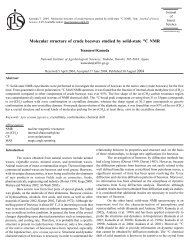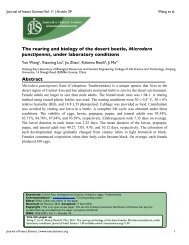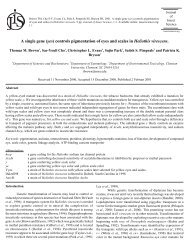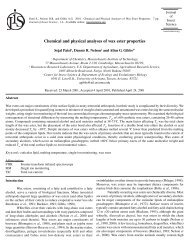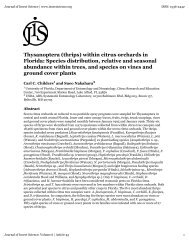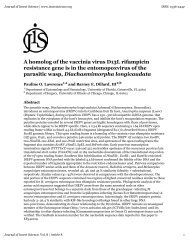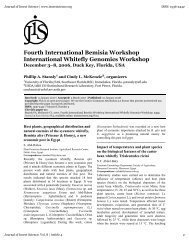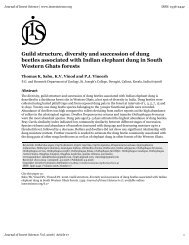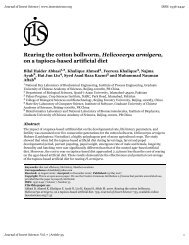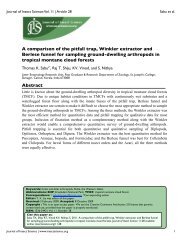Effects of four host plants on biology and food utilization - Journal of ...
Effects of four host plants on biology and food utilization - Journal of ...
Effects of four host plants on biology and food utilization - Journal of ...
You also want an ePaper? Increase the reach of your titles
YUMPU automatically turns print PDFs into web optimized ePapers that Google loves.
<strong>Journal</strong> <str<strong>on</strong>g>of</str<strong>on</strong>g> Insect Science: Vol. 10 | Article 22<br />
sec<strong>on</strong>d instar were not significantly different<br />
<strong>on</strong> Chinese cabbage (90.3%), sweet potato<br />
(86.5%) <strong>and</strong> tobacco (80.6%), but were<br />
significantly higher <strong>on</strong> cowpea (98.9%) than<br />
<strong>on</strong> the other three <str<strong>on</strong>g>host</str<strong>on</strong>g> <str<strong>on</strong>g>plants</str<strong>on</strong>g>. The survival<br />
rates <str<strong>on</strong>g>of</str<strong>on</strong>g> the third instars were similar <strong>on</strong><br />
Chinese cabbage (100%) <strong>and</strong> cowpea<br />
(95.5%), which were higher than those <strong>on</strong><br />
sweet potato (86.8%) <strong>and</strong> tobacco (83.8%).<br />
The <str<strong>on</strong>g>four</str<strong>on</strong>g>th instars survived less <strong>on</strong> tobacco<br />
(90.3%) than <strong>on</strong> the other three <str<strong>on</strong>g>host</str<strong>on</strong>g> <str<strong>on</strong>g>plants</str<strong>on</strong>g><br />
(98.6 - 100%). The survival rates for prepupae<br />
were not significantly different (F = 0.93; df =<br />
3, 15; p > 0.05), but those for pupae were (F =<br />
4.56; df = 3, 15; p < 0.05).<br />
Pupal weight<br />
Pupal weights differed significantly depending<br />
<strong>on</strong> the <str<strong>on</strong>g>host</str<strong>on</strong>g> <str<strong>on</strong>g>plants</str<strong>on</strong>g> <strong>on</strong> which the larvae<br />
were fed <strong>and</strong> differed significantly between<br />
females <strong>and</strong> males when they fed <strong>on</strong> the same<br />
<str<strong>on</strong>g>host</str<strong>on</strong>g> <str<strong>on</strong>g>plants</str<strong>on</strong>g> <strong>and</strong> when larvae fed <strong>on</strong> different<br />
<str<strong>on</strong>g>host</str<strong>on</strong>g> <str<strong>on</strong>g>plants</str<strong>on</strong>g> (p < 0.005) (Table 1). The female<br />
pupae <strong>on</strong> Chinese cabbage were heaviest,<br />
followed by those <strong>on</strong> cowpea <strong>and</strong> sweet<br />
potato, <strong>and</strong> lightest <strong>on</strong> tobacco, <strong>and</strong> the<br />
male pupae <strong>on</strong> Chinese cabbage were heavier<br />
than <strong>on</strong> the other three <str<strong>on</strong>g>host</str<strong>on</strong>g> <str<strong>on</strong>g>plants</str<strong>on</strong>g>. Female<br />
pupae were generally heavier than their male<br />
counterparts, except for those <strong>on</strong> tobacco,<br />
which were the same weight.<br />
Sex ratio, adult l<strong>on</strong>gevity <strong>and</strong> ovipositi<strong>on</strong><br />
Sex ratios were biased, <strong>and</strong> more female<br />
adults emerged than male adults when their<br />
larvae were fed with the <str<strong>on</strong>g>four</str<strong>on</strong>g> <str<strong>on</strong>g>host</str<strong>on</strong>g> <str<strong>on</strong>g>plants</str<strong>on</strong>g> (F =<br />
19.52; df = 3, 15; p = 0.0001) (Table 1). Of<br />
the six treatments, male ratios were higher <strong>on</strong><br />
cowpea <strong>and</strong> sweet potato than <strong>on</strong> the other<br />
two <str<strong>on</strong>g>host</str<strong>on</strong>g> <str<strong>on</strong>g>plants</str<strong>on</strong>g>. The l<strong>on</strong>gevities <str<strong>on</strong>g>of</str<strong>on</strong>g> both<br />
female <strong>and</strong> male S. litura adults were also<br />
significantly affected by the <str<strong>on</strong>g>host</str<strong>on</strong>g> <str<strong>on</strong>g>plants</str<strong>on</strong>g> <strong>on</strong><br />
which their larvae fed (female: F = 6.15; df =<br />
3, 15; p = 0.0089; male: F = 10.6; df = 3, 15;<br />
p = 0.0014). Numbers <str<strong>on</strong>g>of</str<strong>on</strong>g> egg masses <strong>and</strong> total<br />
eggs oviposited by S. litura females <strong>on</strong> the<br />
<str<strong>on</strong>g>four</str<strong>on</strong>g> <str<strong>on</strong>g>host</str<strong>on</strong>g> <str<strong>on</strong>g>plants</str<strong>on</strong>g> differed significantly (egg<br />
masses: F = 16.61; df = 3, 15; p = 0.0001;<br />
total eggs: F = 31.13; df = 3, 15; p = 0.0001)<br />
(Figure 4). S. litura oviposited similar<br />
numbers <str<strong>on</strong>g>of</str<strong>on</strong>g> egg masses <strong>and</strong> eggs per female<br />
<strong>on</strong> cowpea, sweet potato, <strong>and</strong> Chinese<br />
cabbage, but less <strong>on</strong> tobacco than <strong>on</strong> the other<br />
Xue et al.<br />
Figure 4. Egg masses <strong>and</strong> total eggs per female Spodoptera litura <strong>on</strong> <str<strong>on</strong>g>four</str<strong>on</strong>g> <str<strong>on</strong>g>host</str<strong>on</strong>g> <str<strong>on</strong>g>plants</str<strong>on</strong>g>. Host <str<strong>on</strong>g>plants</str<strong>on</strong>g>: CC - Chinese cabbage,<br />
CP - cowpea, SP - sweet potato, <strong>and</strong> TO - tobacco. The same letters over the <str<strong>on</strong>g>four</str<strong>on</strong>g> bars in each figure indicate that the<br />
means are not significantly different at p < 0.05 (Least Significance Difference test, SAS Institute 2008). High quality figures<br />
are available <strong>on</strong>line.<br />
<strong>Journal</strong> <str<strong>on</strong>g>of</str<strong>on</strong>g> Insect Science | www.insectscience.org 7



